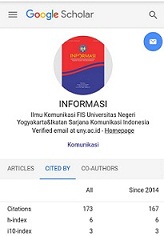Sexual violence in the discourse of digital citizens: Strengthening the concept of digital citizenship as online civic engagement
DOI:
https://doi.org/10.21831/informasi.v53i1.61294Keywords:
Discourse, online civic engagement, digital citizenship, Social MediaAbstract
Cases of sexual violence frequently exposed on social media have sparked intense discussions among digital citizens. This phenomenon has given rise to new patterns of participation in the digital public sphere, indicating progress in efficiently and effectively expressing public aspirations through online civic engagement. Thus, online citizen engagement further strengthens the concept of digital citizenship as an active participation form in the digital world. In this study, the topic modeling method is utilized as a machine learning approach with statistical methods to identify topics within large, unstructured document collections. The applied topic modeling method is Latent Dirichlet Allocation (LDA), using data collected from Twitter through crawling big data using the Twitter API. The results of this research reveal the discourse on sexual violence discussed by citizens with seven topics, namely: 1) Indonesia's sexual violence emergency; 2) Support for the enactment of the Draft Law on the Prevention of Sexual Violence, opposing parties against the Draft Law on the Prevention of Sexual Violence; 3) Pros and cons of Minister of Education and Culture and Research and Technology Regulation No. 30 of 2021 concerning the Prevention and Handling of Sexual Violence in Higher Education; 4) Sexual violence as sadistic behavior; 5) Sexual violence on campuses and in Islamic boarding schools; 6) Support for Minister of Education and Culture and Research and Technology Regulation No. 30 of 2021 for the prevention and handling of sexual violence on campuses; and 7) Stop sexual violence against children and women. From the analysis of the topic modeling results, it is evident that with a good understanding of citizen engagement facilitated by technology, the younger generation can develop digital citizenship in the practice of online civic engagement.
References
Blei, D. M. (2012). Probabilistic topic models. Communication of the ACM, 55(4), 77–84.
Blei, D. M., Ng, A. Y., & Jordan, M. I. (2003). Latent dirichlet allocation. Journal of Machine Learning Research, 3, 993–1022.
Breiding, M. J., Basile, K. C., Smith, S. G., Black, M. C., & Mahendra, R. (2015). Intimate partner violence surveillance: Uniform definitions and recommended data elements. Centers for Disease Control and Prevention National Center for Injury Prevention and Control. https://doi.org/10.1002/oms.1210161107
Carpini, M. X. D. (2000). Gen.com: Youth, civic engagement, and the new information environment. Political Communication, 17(4), 341–349. https://doi.org/10.1080/10584600050178942
Cho, A., Byrne, J., & Pelter, Z. (2020). Digital civic engagement by young people (Issue February). UNICEF Office of Global Insight and Policy Alexander.
CNN-Indonesia. (2021). Marak kekerasan seksual sepanjang 2021. Cnnindonesia.Com. https://www.cnnindonesia.com/nasional/20211223151929-20-737872/marak-kekerasan-seksual-sepanjang-2021
Ehrlich, T. (2000). Civic responsibility and higher education (American council on education oryx press series on higher Ed) (The ACE series on higher education). Rowman & Littlefield Publishers.
Fulu, E., Jewkes, R., Roselli, T., & Garcia-Moreno, C. (2013). Prevalence of and factors associated with male perpetration of intimate partner violence: Findings from the UN multi-country cross-sectional study on men and violence in Asia and the Pacific. The Lancet Global Health, 1(4), e187–e207. https://doi.org/10.1016/S2214-109X(13)70074-3
Gladwell, M. (2010, October). Small change: Why the revolution will not be tweeted. New Yorker. https://www.newyorker.com/magazine/2010/10/04/small-change-malcolm-gladwell
Habermas, J. (1996). Between facts and norms: Contributions to a discourse theory of law and democracy. MIT Press. https://doi.org/10.2307/2941077
Hobbs, R., & Jensen, A. (2009). The Past , Present , and Future of Media Literacy Education. Journal of Media Literacy Education, 1, 1–11.
Kahne, J., Hodgin, E., & Eidman-Aadahl, E. (2016). Redesigning civic education for the digital age: Participatory politics and the pursuit of democratic engagement. Theory and Research in Social Education, 44(1), 1–35. https://doi.org/10.1080/00933104.2015.1132646
Keeter, S., Zukin, C., Jenkins, K., & Jenkins, K. (2002). The civic and political health of the nation: A generational portrait.
Kompas.com. (2022). Perjalanan RUU TPKS, enam tahun terombang-ambing di DPR. Kompas. https://nasional.kompas.com/read/2022/02/24/06373451/perjalanan-ruu-tpks-enam-tahun-terombang-ambing-di-dpr?page=all
Marichal, J. (2013). Political facebook groups : Micro-activism and the digital front stage. First Monday, 18(12). https://doi.org/10.5210/fm.v18i12.4653
Mossberger, K., Tolbert, C. J., & McNeal, R. S. (2008). Digital citizenship: The internet, society, and participation. The MIT Press.
Mulyono, B. (2017). Reorientasi civic disposition dalam kurikulum Pendidikan Kewarganegaraan sebagai upaya membentuk warga negara yang ideal. Jurnal Civic, 14, 218–225.
Nishishiba, M., Nelson, H. T., Shinn, C., Nishishiba, M., Nelson, H. T., & Shinn, C. W. (2005). Explicating factors that foster civic engagement among students. Journal of Public Affairs Education, 11(4), 269–285.
Putnam, R. D. (2000). Bowling alone: The collapse and revival of American Community. Simon & Schuster.
Raynes-Goldie, K., & Walker, L. (2008). Our space: Online civic engagement tools for youth. In W. L. Bennett (Ed.), Civic Life Online: Learning How Digital Media Can Engage Youth (pp. 161–189). The MIT Press.
Ribble, M., & Bailey, E. (2011). Digital Citizenship in Schools. International Society for Technology in Education.
Ribble, M., Bailey, G., & Ross, T. (2004). Digital citizenship: Addressing appropriate technology behavior. Learning and Leading with Technology, 32, 6–11.
Shirky, C. (2008). Here comes everybody: The power of organizing without organizations. Penguin.
Simsek, E., & Simsek, A. (2013). New literacies for digital citizenship. Contemporary Educational Technology, 4(2), 126–137.
Uldam, J., & Vestergaard, A. (2015). Introduction: Social media and civic engagement. In J. Uldam & A. Vestergaard (Eds.), Civic Engagement and Social Media: Political Participation Beyond Protest (pp. 1–23). Palgrave Macmillan. https://doi.org/10.1057/9781137434166
WHO. (2021). Violence against women. https://www.who.int/news-room/fact-sheets/detail/violence-against-women
Zuckerman, E. (2014). New Media , New Civics ? Policy and Internet, 6(2), 151–168.
Zukin, C., Keeter, S., Andolina, M., Jenkins, K., & Carpini, M. X. D. (2006). A new engagement? Political participation, civic life, and changing American Citizen. Oxford University Press.
Downloads
Published
How to Cite
Issue
Section
Citation Check
License
Authors who publish with this journal agree to the following terms:
- Authors retain copyright and grant the journal right of first publication with the work simultaneously licensed under a Creative Commons Attribution License that allows others to share the work with an acknowledgement of the work's authorship and initial publication in this journal.
- Authors are able to enter into separate, additional contractual arrangements for the non-exclusive distribution of the journal's published version of the work (e.g., post it to an institutional repository or publish it in a book), with an acknowledgement of its initial publication in this journal.
- Authors are permitted and encouraged to post their work online (e.g., in institutional repositories or on their website) prior to and during the submission process, as it can lead to productive exchanges, as well as earlier and greater citation of published work (See The Effect of Open Access).











